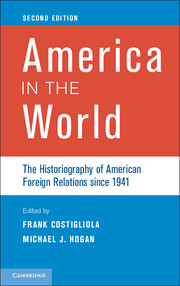Book contents
- Frontmatter
- Dedication
- Contents
- List of Contributors
- Preface
- 1 Introduction
- 2 The Charlie Maier Scare and the Historiography of American Foreign Relations, 1959–1980
- 3 Chaps Having Flaps: The Historiography of U.S. Foreign Relations, 1980–1995
- 4 Still Contested and Colonized Ground: Post–Cold War Interpretations of U.S. Foreign Relations during World War II
- 5 Recent Literature on Truman’s Atomic Bomb Decision
- 6 The Cold War
- 7 Cold War Presidents: Dwight D. Eisenhower, John F. Kennedy, Lyndon Baines Johnson, and Richard M. Nixon
- 8 The War that Never Ends: Historians and the Vietnam War
- 9 Culture and the Cold War: U.S.–Latin American Historiography since 1995
- 10 Impatient Crusaders: The Making of America’s Informal Empire in the Middle East
- 11 Explaining the Rise to Global Power
- 12 Bringing the Non-State Back In
- 13 Technology and the Environment in the Global Economy
- 14 U.S. Mass Consumerism in Transnational Perspective
- 15 A Worldly Tale
- Index
- References
5 - Recent Literature on Truman’s Atomic Bomb Decision
The Triumph of the Middle Ground?
Published online by Cambridge University Press: 05 June 2014
- Frontmatter
- Dedication
- Contents
- List of Contributors
- Preface
- 1 Introduction
- 2 The Charlie Maier Scare and the Historiography of American Foreign Relations, 1959–1980
- 3 Chaps Having Flaps: The Historiography of U.S. Foreign Relations, 1980–1995
- 4 Still Contested and Colonized Ground: Post–Cold War Interpretations of U.S. Foreign Relations during World War II
- 5 Recent Literature on Truman’s Atomic Bomb Decision
- 6 The Cold War
- 7 Cold War Presidents: Dwight D. Eisenhower, John F. Kennedy, Lyndon Baines Johnson, and Richard M. Nixon
- 8 The War that Never Ends: Historians and the Vietnam War
- 9 Culture and the Cold War: U.S.–Latin American Historiography since 1995
- 10 Impatient Crusaders: The Making of America’s Informal Empire in the Middle East
- 11 Explaining the Rise to Global Power
- 12 Bringing the Non-State Back In
- 13 Technology and the Environment in the Global Economy
- 14 U.S. Mass Consumerism in Transnational Perspective
- 15 A Worldly Tale
- Index
- References
Summary
After more than sixty-five years, the use of atomic bombs against Japan in 1945 continues to produce highly polarized controversy. The scholarly debate over the atomic bomb began in earnest in the mid-1960s and made national headlines when it erupted into angry recriminations over the Smithsonian Institution’s proposed Enola Gay exhibit during the mid-1990s. The controversy has long featured doctrinaire arguments at both ends of the interpretive spectrum in which participants all too often supported their positions with strong assertion rather than with strong evidence. The uncompromising nature of the debate muddied efforts to evaluate the strengths and weaknesses of the competing claims and to find a defensible middle ground. Scholars who took a stance somewhere between the extremes have sometimes been drowned out by the bluster at the poles, or worse, had their findings distorted by partisans in the controversy. And yet, it now appears that recent scholarship is moving away, perhaps decisively, from extreme positions toward balanced presentations on what a poll of journalists ranked in 1999 as the top news story of the twentieth century. The controversy has not ended, but the trend seems to point to a more restrained and civil discussion.
The fundamental issue that has divided scholars over a period of more than four decades is whether the use of the bomb was necessary to achieve victory in the Pacific war on terms satisfactory to the United States. The traditional interpretation insisted that the bomb was necessary to avert an invasion of Japan and avoid the loss of huge numbers of American lives. Scholars who advanced this position generally suggested that Truman faced a categorical choice between the bomb and an invasion that was forced on him by Japan’s refusal to surrender. The revisionist interpretation that rose to prominence in the mid-1960s took sharp exception.
- Type
- Chapter
- Information
- America in the WorldThe Historiography of American Foreign Relations since 1941, pp. 83 - 104Publisher: Cambridge University PressPrint publication year: 2013

